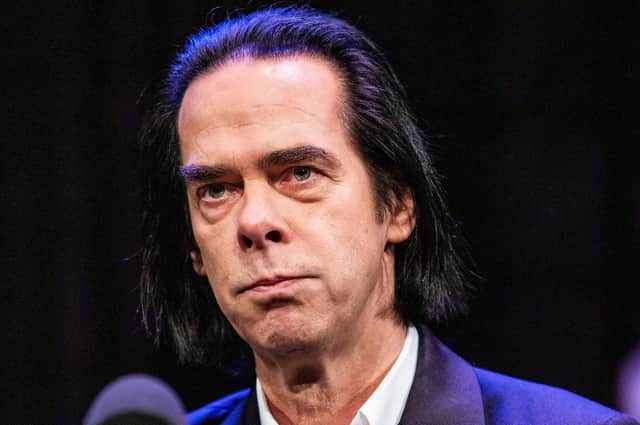What Nick Cave has taught me about life – Euan McColm


Fortunately, the more damaging compulsions which were to follow are blurs in the rear-view mirror, these days. But I continue to feed the habit I acquired in the early 1980s.
If I have money to spare, I buy records. Lots of them. I can’t stop searching for a new hit, for some piece of music that will - for a few minutes, at least - change me and the world around me.
Advertisement
Hide AdAdvertisement
Hide AdIn the beginning, because I had few points of reference, I was fairly undiscerning. If a record had been marked down to 50p, I’d take the gamble. An unintelligible punk single by The Exploited? Yes please. A dreadful Bad Manners song pressed on a picture disc shaped like singer Buster Bloodvessel’s head? That’ll do for me.
It was this desire for a bargain that saw me gladly agree to swap a 12” single for an LP that a neighbour’s older brother had bought a couple of years before and no longer wanted. I didn’t even listen to the album in question before the trade, I simply reckoned that getting 11 songs in exchange for three was a deal too good to miss.
The gamble paid off. The album in question, “Prayers On Fire” by The Birthday Party, gripped me. It was dark and strange, all shrieks and screeching guitars. I’d listen to it in the dark at night and it would unsettle me.
In my mind, I linked the album to the John Carpenter movie “The Fog”, considering it something of a companion piece. I thought that if dead sailors could make a record, they’d make one that sounded exactly like “Prayers On Fire”.
The Birthday Party - a dysfunctional group of Australians who’d relocated to London in search of success - were no more within a year of me first hearing them but their singer, Nick Cave, was soon back in the studio.
Over almost four decades, Cave - who turned 65 on Thursday just passed - and his band The Bad Seeds have released a stream of records - some exceptional, some merely great - which have turned him from cult hero to bona fide rock ’n' roll superstar. His albums nestle comfortably at the top of what I simply refuse, because it irritates my children, to stop calling the hit parade and the Bad Seeds sell out arena tours in minutes.
Bleak proof of Cave’s status in the show-business hierarchy came in 2015 when his son Arthur, then 15, died after falling from a cliff near the family home in Hove. The singer and his fashion designer wife Susie were photographed visiting the place where their son had fallen. Their grief was packaged into tabloid spreads.
I doubt I’m alone in wondering how parents who lose children are able to carry on. In my case the joy of the birth of my children was accompanied by the still ever-present fear that something terrible might happen to them. Usually, this fear hisses away at the back of my mind, a barely audible white noise, but when the worst has happened to people I know or who happen to be in the public eye, it roars. All other parents, I assume, will have their own version of this.
Advertisement
Hide AdAdvertisement
Hide AdCave did not merely carry on. He did something quite remarkable.
In his grief, he established a website - The Red Hand Files - and invited fans to email. Ask me anything, he said. Nothing is off limits.
Over the past four years, Cave has received thousands of questions - he gets between 50-100 emails each day - and thoughtfully answered hundreds of them.
People write with their own stories of loss, ask for advice in love, or - more mundanely - wonder who his favourite artists or musicians might be.
If you have not visited the site, I recommend you do. You need not be an admirer of Cave’s music (though I have my doubts about you if you are not) to enjoy and, perhaps find solace in, The Red Hand Files. It is clear that Cave is lifted by the community that’s grown around this unusual project.
On Cave’s birthday, he and the journalist Seán O’Hagan published “Faith, Hope and Carnage” a book of conversations about topics as varied as creativity, friendship, religion and loss.
This fascinating book is speckled with wisdom and rich in ideas. It is an entirely unpretentious stroll by two friends through matters big and small. One moment Cave describes how Coldplay singer Chris Martin suggested the removal of the sound of “a f****** canning factory” from a recording, the next he discusses his belief that Arthur might exist within the most recent Bad Seeds album “Ghosteen”.
The young Nick Cave, inspired by the great Scottish rock ’n’ roll vaudevillian Alex Harvey and Brisbane punks The Saints, clattered into the public eye, all confrontation and drugged-up excess.
Advertisement
Hide AdAdvertisement
Hide AdToday, he - along with his song-writing partner Warren Ellis - is creating music as strange as it is beautiful. The more successful he became, the more avant garde his work. This is not the way things are supposed to go. The older a musician becomes, the less vital they are meant to be, They are meant to grow lazy and to return to tested formulae.
Reading Cave and O’Hagan’s book, I was particularly struck by his desire to be kinder. “I’m older and wiser, now,” he tells his co-author, “I spend more time hanging out at the better end of my character, I hope so.”
This is something I strive to do, these days. Not always with success.
As Nick Cave marks his 65th birthday, I must say it has been a pleasure to try to grow-up alongside him.
Comments
Want to join the conversation? Please or to comment on this article.